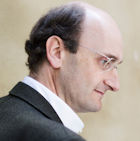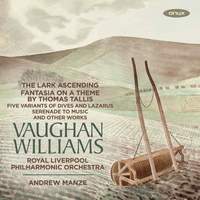Interview,
Andrew Manze on Vaughan Williams
 Andrew Manze's acclaimed Vaughan Williams cycle drew to its close in May, with the vivid Sinfonia antartica paired with the mysterious No. 9 in E minor. It's been quite a journey for a conductor whom many classical fans would have known first as a Baroque instrumentalist – Andrew was kind enough to share some thoughts on the conclusion of this series, and the relationship between his previous music-making and his life on the podium.
Andrew Manze's acclaimed Vaughan Williams cycle drew to its close in May, with the vivid Sinfonia antartica paired with the mysterious No. 9 in E minor. It's been quite a journey for a conductor whom many classical fans would have known first as a Baroque instrumentalist – Andrew was kind enough to share some thoughts on the conclusion of this series, and the relationship between his previous music-making and his life on the podium.
As reviewers have almost invariably pointed out, you started your career as a violinist rather than a conductor, and a Baroque-focused one at that. How did you come to take on such an utterly different project as this Vaughan Williams series?
Reviewers and concert-goers cannot know what my musical roots were before I ’turned’ baroque. As a fourteen year old, I played in VW's Tallis Fantasia as a member of the Bedfordshire Youth Orchestra, and then heard the Serenade to Music from the Proms on the radio. I rushed to my local library to borrow a record of the Serenade (Boult, of course) and vividly remember turning the record over and hearing the opening of the Fifth Symphony for the first time. I was instantly captivated by its magic. Hugely enjoyable and important to my development as a thinking musician though it has been, my baroque career might be seen as a detour from my first love, nineteenth- and twentieth-century orchestral music.
I went deeply into VW’s symphonies when the BBC Scottish and I did a cycle a few years ago, and then I was thrilled that the Royal Liverpool Philharmonic, with its venerable Vaughan Williams tradition, asked me to perform the cycle and record it for Onyx. Every minute has been an honour and pleasure, and credit must also go to Andrew Keener and Phil Rowlands, producer and engineer, who were as personally involved in the cycle as the musicians.
You’ve always had a strong reputation for historical awareness in your Baroque music-making – do you find there’s any element of historically-informed performance to be borne in mind with these much more recent works?
We all refer to it as ‘historical awareness’ but it might more properly be described as a logical, consequent approach applicable to all repertoire, however new or old. I ask the same questions of every piece/style and find very different answers. In the 2019 Proms my ‘home’ orchestra, the North German Radio Philharmonic, played Bach’s great Fantasia and Fugue, originally for organ, in Elgar’s orchestration. We asked ourselves: should we play it with techniques appropriate to Bach or to Elgar? And we hit upon trying to imagine how Elgar’s musicians would have approached such antique music. The differences are subtle but they made us feel more sure of ourselves - and it is always worth bearing in mind that most listeners don’t give a hoot, so long as it works as a performance.
Another exhilarating exercise is to study a work by a living composer, try to work out what to do and then to meet the composer, sometimes only a few hours or minutes before the performance, to see whether your thoughts chime. In the case of absent composers, i.e. the vast majority of cases, the ‘meeting’ is more of a thought exercise, very stimulating to the imagination.
With works such as these, it’s inevitable that certain elements or passages come to be seen, and approached, in certain ways – the enigmas surrounding the meaning of the icy final movement of the Sixth, to take just one example. What would you say was the most difficult interpretative decision you had to make in preparing the nine symphonies?
My long years in the field of historical awareness have made me very wary of traditions. Some are valid and valuable; others are, as Mahler said, the result of lazy thinking. VW’s symphonies have not suffered too much (yet) from this problem, perhaps because his music is mostly so clear in its intentions, however nebulous it sounds. Where I departed furthest from current received opinion was in the final (and to my mind greatest) symphony, No. 9. I felt that the composer himself, by then elderly and with his eyes on a different horizon, was cautious about his tempo marks, and his early interpreters showed a proper respect for his intentions. But too many performances (including some of my own) felt hasty at the printed tempos. Looking more into the sketches and source material, I found justifications for my instinct for slower speeds, particularly in the finale, so I went with that gut feeling. The result is, I believe, that the wonderful Liverpool musicians and I have done a good service for this twilight masterpiece.
Do you see yourself returning to violin-playing in the future, or are you now officially 'retired' as an instrumentalist?
It was a slow, natural evolution from violinist to conductor. I put down my violin for good eleven years ago, having been playing since I was nine. (As Jack Benny would say: I was exhausted!) As a conductor, I now hear great violin-playing all around me in orchestras, and I get to collaborate in concertos with some of the world’s finest soloists.
We hear that there’s more to come, with an upcoming album featuring a number of time-honoured Vaughan Williams favourites including an orchestral-only version of the Serenade to Music. Is there more Vaughan Williams on the way after this – the operas, maybe…?
The Liverpool orchestra and I have recorded some of VW's smaller gems and we have our eyes and hearts set on one day recording his great 'Masque for dancing', Job. And there is so much VW still to explore…!
 Manze Vaughan Williams Symphonies
Manze Vaughan Williams Symphonies
Andrew Manze's cycle of the Vaughan Williams symphonies with the Royal Liverpool Philharmonic Orchestra began in 2016 and concluded earlier this year with 'probing, sympathetic interpretations' (Gramophone) of Sinfonia antartica and Symphony No. 9.
Vaughan Williams: The Lark Ascending & Fantasia on a Theme By Thomas Tallis
James Ehnes (violin), Royal Liverpool Philharmonic Orchestra, Andrew Manze
This new album of Vaughan Williams's shorter works (which also includes Five Variants of Dives and Lazarus and the rarely-performed orchestral version of Serenade to Music) will be released on Onyx on 11th October and is now available to pre-order.
Available Formats: CD, MP3, FLAC, Hi-Res FLAC



